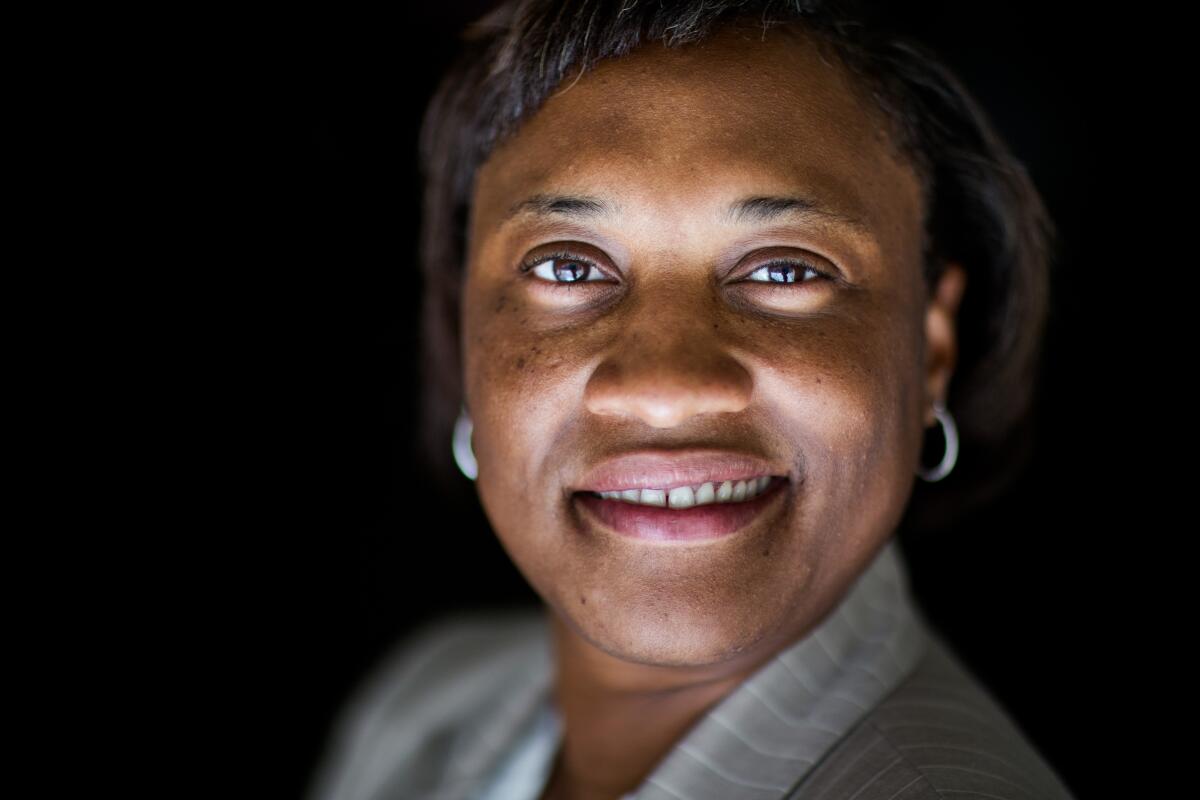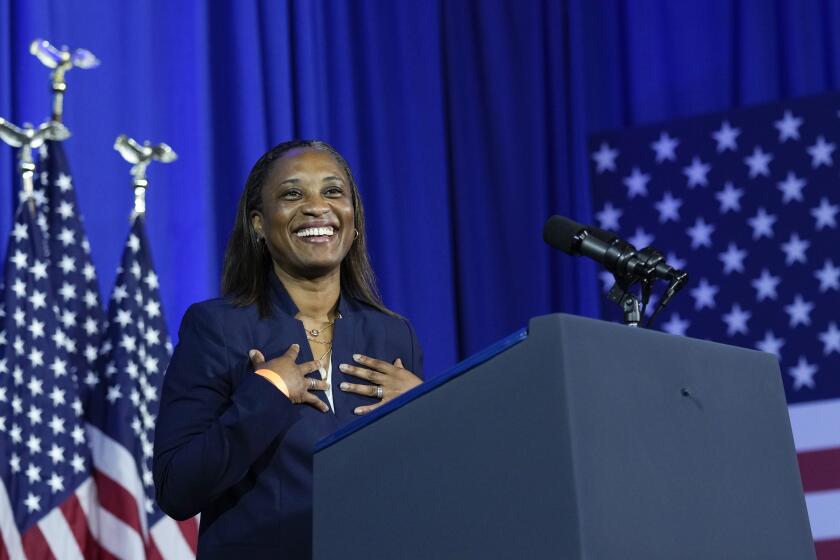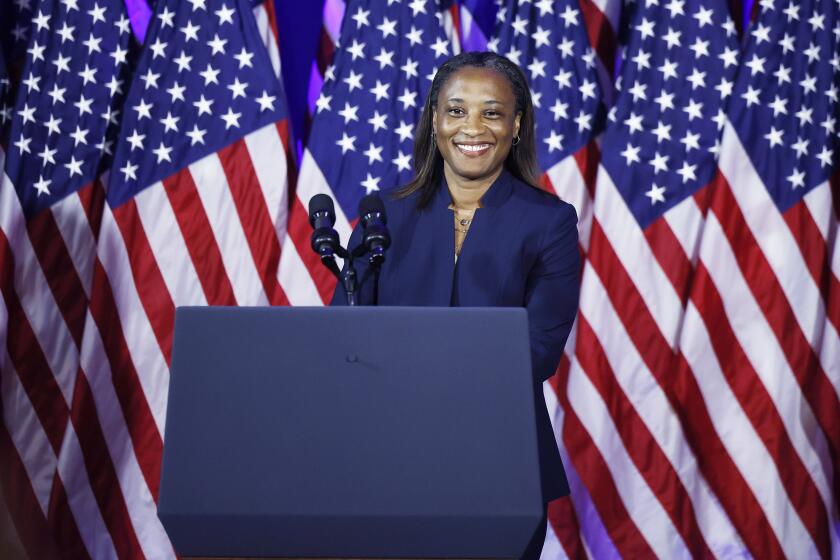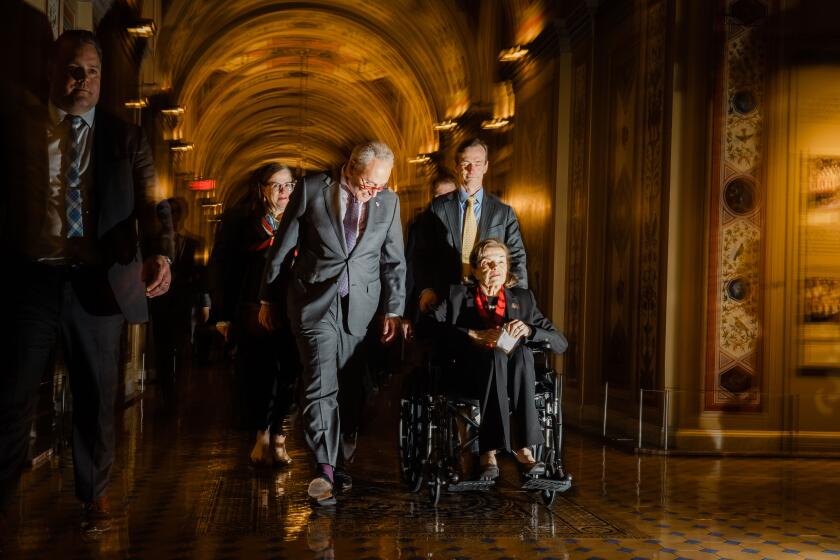Column: A solid Senate pick and a craven move by Gavin Newsom

Gavin Newsom was in his element, hand-feeding dishy commentary to an eager political press corps.
As a marquee surrogate for the Biden campaign, California’s governor was gleefully taking down Republicans at last week’s caterwauling presidential debate in Simi Valley. He took particular aim at a longtime nemesis, Florida Gov. Ron DeSantis.
The two have agreed to go mano-a-mano next month on Fox News, and Newsom was taking full credit. “If you can goad someone this easy, can you imagine what Kim Jong Un or Putin could do with this guy?” Newsom taunted.
Good question.
Newsom should ask himself: If he can be goaded that easily — caving to pressure and flip-flopping on a pledge to name a Senate caretaker to replace the late Dianne Feinstein — how would he ever stand up to a foreign potentate?

Newsom’s selection of Laphonza Butler, a Democrat with years of deep experience strategizing in campaigns and the labor movement, came as a surprise, mostly because her name was not among those widely bandied about.
When she is sworn in Tuesday by Vice President Kamala Harris — a friend and former client — Butler will make history as the first out gay person of color to serve in the Senate and the first LGBTQ+ senator from California.
Butler is a Democratic strategist who rose to prominence in the labor movement and previously was an advisor to Kamala Harris’ presidential campaign.
Beyond that, Butler brings a fresh and welcome perspective to a Senate heavily populated with geriatrics and the well-to-do.
She grew up in small-town Magnolia, Miss., where her widowed mother worked multiple jobs to support three children. She attended Jackson State University, a historically Black college, where veterans of the civil rights movement imbued Butler with a passion for social justice.
As a labor organizer, Butler worked to better the lives of nurses in Baltimore and Milwaukee, janitors in Philadelphia and hospital workers in New Haven, Conn. No hedge funds or silver spoon in her background.
At age 44, Butler is young enough to potentially have a long and impactful Senate career.
Gov. Gavin Newsom appointed Laphonza Butler to fill the Senate seat that was held by Dianne Feinstein, who died Friday. Who is Butler?
But Newsom never should have appointed her — or anyone else — to fill Feinstein’s seat without a promise to serve the balance of the late senator’s term, then stand aside once voters made their selection. Just last month, the governor had said he would see to that.
“Interim appointment,” he said on NBC’s “Meet the Press,” noting that a fiercely competitive Senate primary was already well underway and he wished to steer clear.
“It would be completely unfair to the Democrats that have worked their tail off,” Newsom said, and he was absolutely right. “That primary is just a matter of months away. I don’t want to tip the balance of that.”
Um. Never mind.
Newsom went ahead and showed he was just fine upending that balance, assuming Butler decides to seek a full term. She has yet to publicly state her plans.
But if Butler chooses to run, she’ll get no opposition from the governor.
“If that person decides she wants to seek a full term in 2024, then she is free to do so,” spokesman Anthony York said hours before Newsom announced his pick Sunday night. “There is absolutely no litmus test, no promise.”
And no consistency from the governor.
Give credit where due: the flipping and flopping, the wilting under political heat, is all a product of his own ham-fisted making.
In March 2021, Newsom was facing a threatened recall. There was antagonism from some Black voters because the governor failed to appoint a Black woman to replace Harris when she became vice president. Instead, he chose Alex Padilla, who made history as California’s first Latino senator.
Seeking to make amends — and shore up his political base — Newsom rashly promised to appoint a Black woman if Feinstein’s seat came open. He amended that pledge to say his appointee would be a placeholder, which drew umbrage from Rep. Barbara Lee and her supporters.
Lee is one of those vying for the Senate seat, along with the front-running Reps. Adam B. Schiff and Katie Porter, and the only prominent Black woman in the contest. She and others suggested Newsom’s caretaker pledge was an insult to Black women.
They mounted an aggressive campaign urging Newsom to change his mind and appoint the Oakland lawmaker, giving Lee a substantial advantage in the March 5 primary. Among those weighing in was Nevada Rep. Steven Horsford, chairman of the Congressional Black Caucus, who lobbied Newsom in person and by phone.
Then came Newsom’s Sunday night pirouette, a reflection of one of his worst traits: a reactive, short-sighted impulse to act in the moment with little heed for longer-term consequences. It’s something voters should consider when, and if, he ever seeks the White House.
It was selfish for Sen. Dianne Feinstein to stay in office. The other side to that stubbornness: ramrod determination and an unsinking resilience.
After Harris was elected vice president, Newsom spent weeks pondering his choice of a successor. He publicly wrung his hands, lamenting the quandary he faced. Inevitably, he knew, he’d end up antagonizing someone, regardless of who was chosen.
“This is not something that I wish even on my worst enemy,” Newsom said of the dilemma he faced.
The lamentation was cringey, in a small-violin way. After all, governors are called upon to make tough decisions all the time. Filling a Senate vacancy is one of them.
With any luck, Newsom will never have to do so again.
Because he sure made a hash out of this one.
More to Read
Get the latest from Mark Z. Barabak
Focusing on politics out West, from the Golden Gate to the U.S. Capitol.
You may occasionally receive promotional content from the Los Angeles Times.














